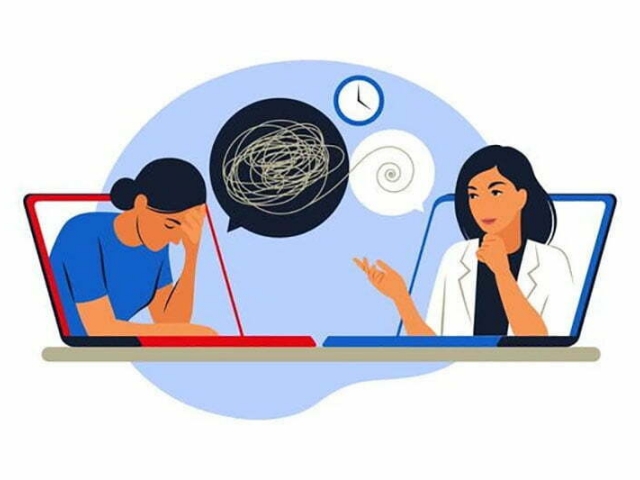5 Tips for Getting the Most Success Out of Your Online Counseling Program
In recent years, online counseling programs have become increasingly popular for people to access mental health support from the comfort of their homes. Online counseling programs offer a convenient and accessible way for individuals to receive therapy without leaving their houses or commuting to a therapist’s office. With the rise of telehealth, online counseling programs have become an essential resource for those seeking mental health support. However, like any therapy, getting the most success out of your online counseling program requires intention and effort. In this blog post, we’ll explore five tips to help you make the most out of your online counseling program and achieve your mental health goals.

Choose the Right Online Therapy Provider
One of the most critical factors in the success of your online therapy is choosing the right provider. Knowing which will best fit you can be challenging with so many online therapy options.

Here are some factors to consider when choosing an online therapy provider:
- Licensing and qualifications: Ensure the therapist you choose is licensed and qualified to provide therapy in your state or country.
- Specialization: If you’re struggling with a specific issue, such as anxiety or depression, look for a therapist who specializes in that area.
- Fees: Online therapy can be expensive, so consider your budget when choosing a provider. Some providers offer sliding-scale fees based on income.
- Accessibility: Make sure the provider’s schedule aligns with yours and that they offer flexible appointment times.
- Platform: Look for a provider that uses a secure and user-friendly platform for online sessions.
Once you’ve chosen an online therapy provider, building a rapport with them is essential. This can take time, but feeling comfortable and open in your therapy sessions is crucial.
Prepare for Your Online Therapy Sessions
Preparing for your online therapy sessions can help you get the most out of them. Here are some ways to prepare:

- Find a quiet and private space: Make sure you’re in a quiet and private space where you won’t be interrupted during your session. This can help you feel more comfortable and open.
- Test your technology: Test your internet connection and audio and video settings before your session to avoid technical difficulties during your appointment.
- Write down your thoughts and feelings: Jotting down your thoughts and feelings before your session can help you organize your thoughts and give you a starting point for your conversation with your therapist.
- Set goals: Consider what you want to achieve from your therapy sessions, whether managing anxiety or improving relationships. Setting goals can help you stay focused and motivated during your sessions.
- Be honest and open: It’s essential, to be honest and open with your therapist. They’re there to help you; the more they know, the better they can assist you.
Practice What You Learn in Therapy
Online therapy can be incredibly beneficial, but it’s only one part of the equation. You must practice what you learn daily to get the most out of your therapy sessions.

Here are some ways to practice what you learn in therapy:
- Take action: If your therapist recommends a particular exercise or activity to help manage your anxiety, try incorporating it into your daily routine.
- Be mindful: Mindfulness is an essential part of therapy, and it can help you manage stress and improve your mental health. Practice mindfulness exercises regularly, such as deep breathing or meditation.
- Set boundaries: If your therapist recommends setting boundaries with someone in your life, try to implement them and stick to them.
- Focus on the positive: Therapy can help you reframe negative thoughts and focus on the positive aspects of your life. Try to practice gratitude by journaling about things you’re thankful for.
- Be patient: It takes time to see results from therapy, so be patient with yourself and the process. Trust that the work you’re doing in therapy will pay off in the long run.
Additionally, it’s essential to communicate with your therapist about what’s working and what’s not. If something isn’t helping or feels uncomfortable, bring it up in your session so you can work together to find a solution.
Stay Committed to Your Therapy
Consistency is critical to getting the most out of online therapy. Committing to regular therapy sessions and prioritizing them in your schedule is essential. Skipping or canceling appointments can slow your progress and make it harder to achieve your therapy goals.

In addition, it’s essential to be open to feedback and willing to change your behavior and thought patterns. Change can be challenging, and it may feel uncomfortable initially, but it’s necessary to achieve growth and improve your mental health.
Staying committed to your therapy also means being honest with yourself and your therapist. If you’re feeling resistant to therapy or struggling to implement changes, bring it up in your session to work through it together.
Use Online Therapy Resources to Supplement Your Sessions
Many online therapy platforms offer additional resources to supplement your therapy sessions. These resources can include worksheets, videos, and articles on mental health topics.

These resources can help you deepen your understanding of the issues you’re working through and provide additional support between therapy sessions. They can also give you ideas for self-care practices and coping strategies to use daily.
In addition, many online therapy providers offer support groups and forums where you can connect with other people going through similar experiences. These groups can provide a sense of community and support, which can be especially helpful if you feel isolated or alone.
By using online therapy resources to supplement your therapy sessions, you can maximize the benefits of online therapy and make progress toward your mental health goals.
In conclusion, online counseling programs are a powerful tool for improving mental health and well-being. By following these five tips, including choosing the right provider, preparing for your sessions, practicing what you learn in therapy, staying committed, and utilizing online counseling program resources, you can get the most out of your online counseling program and achieve the mental wellness you deserve. Remember, seeking help is a sign of strength, and taking care of your mental health is just as important as taking care of your physical health. If you’re struggling, don’t hesitate to contact a mental health professional for support. Together, you can work towards a brighter and more fulfilling future.






